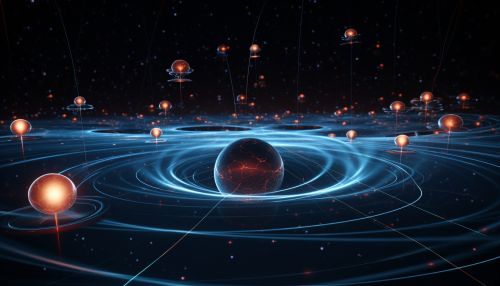Quantum Ground State
Introduction
The quantum mechanical description of physical systems necessitates the concept of a ground state. The quantum ground state, also referred to as the zero-point energy of a system, is the lowest energy state that a quantum mechanical physical system can possess. Unlike classical systems, quantum systems constantly fluctuate in their lowest energy state due to the Heisenberg uncertainty principle.


Quantum Ground State in Quantum Mechanics
In quantum mechanics, the ground state is usually called the zero-point energy of a system. It is the energy of its ground state, which is the state of the lowest possible energy that a quantum mechanical physical system may have. Unlike in classical mechanics, quantum systems constantly fluctitate in their lowest energy state due to the Heisenberg uncertainty principle. As well as that, quantum systems may be in a superposition of states, which may be an eigenstate corresponding to different energy levels; these are often called "excited states".
Quantum Harmonic Oscillator
The simplest example of a quantum mechanical system is the quantum harmonic oscillator. In this system, the ground state can be defined as the state in which the oscillator has the minimum possible energy, or zero-point energy. The energy of the ground state is not zero, as might be expected from classical physics, but is instead given by the formula E = 1/2hf, where h is Planck's constant and f is the frequency of the oscillator. This result is a consequence of the Heisenberg uncertainty principle, which states that the product of the uncertainties in position and momentum must be at least as large as a certain constant value, known as the reduced Planck's constant.


Quantum Field Theory
In quantum field theory, the ground state is usually called the vacuum state or the vacuum. If more than one ground state exists, they are said to be degenerate. Many system can have degenerate ground states, such as a quantum paramagnet at the quantum critical point, or a laser in the regime of quantum noise. The ground state of a quantum field theory is usually a state in which no field excitations exist, but this is not the case in the presence of a non-zero temperature or a condensate.
Ground State Degeneracy
Ground state degeneracy occurs when the lowest energy level of a quantum system has more than one linearly independent state. In such cases, the ground state is said to be degenerate. This phenomenon is common in systems with high symmetry, where energy levels may be the same for different states of the system.
Quantum Computing and Ground State
In the field of quantum computing, the ground state is of particular interest. Quantum algorithms, such as the quantum phase estimation algorithm, can provide estimates of ground state energies of certain quantum systems. Moreover, the ground state of a quantum computer is used as the starting point for most quantum computations.
See Also
- Quantum Mechanics
- Heisenberg Uncertainty Principle
- Quantum Harmonic Oscillator
- Quantum Field Theory
- Quantum Computing
References
1. Griffiths, David J. (2005). Introduction to Quantum Mechanics (2nd ed.). Prentice Hall. ISBN 0-13-111892-7. 2. Cohen-Tannoudji, Claude; Diu, Bernard; Laloë, Franck (1977). Quantum Mechanics (2nd ed.). Wiley. ISBN 978-0-471-16433-3. 3. Sakurai, J. J. (1994). Modern Quantum Mechanics (Revised ed.). Addison-Wesley. ISBN 0-201-53929-2. 4. Feynman, Richard P. (2010). QED: The Strange Theory of Light and Matter. Princeton University Press. ISBN 978-0-691-12575-6.
